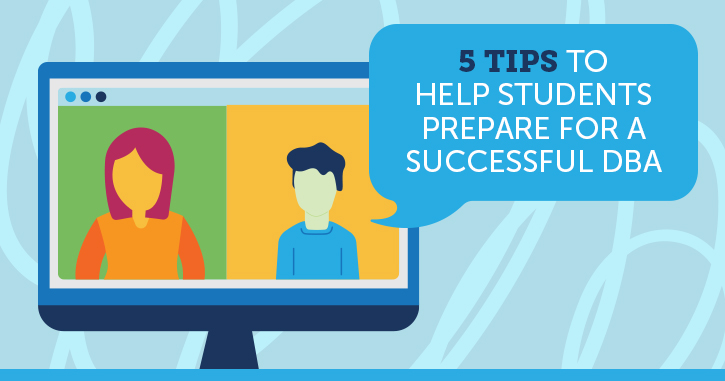Discussion-Based Assessments
5 Tips to Help Students Prepare for a Successful DBA
By Guest Blogger on March 8th, 2023

This post was written by Cecilia Mo’Neesha K., a FLVS Flex student.
Discussion-based assessments (DBAs) are something that many students may feel anxious about, including myself. Whether you feel unprepared or don’t understand the module, there are several reasons students may dread DBAs. As a 14-year-old in 11th grade, I find myself spending endless hours writing arguments, notes, watching help videos, and attending tutor sessions for a DBA, which is really a conversation that takes less than 10 minutes (LOL)! In this blog, I will go over five tips to help my fellow students prepare for a successful DBA. These tips will help with studying, taking notes, overcoming anxiety, and more!
Continue reading7 Tips from FLVS Students for Taking Better Notes
By Florida Virtual School on January 14th, 2022

It feels like the first day of school was just yesterday, but here we are, starting the second half of the school year! With exams, graduation, and summer break just around the corner, it’s time to study smarter, not harder.
Continue reading5 Tips for Learning a Language Online
By Florida Virtual School on August 4th, 2021

Learning a new language online might seem like an intimidating task, but what if we told you, it is as easy as watching your favorite show? Or listening to new music? Our World Language teachers know exactly what it’s like to learn a new language—and have advice to turn the challenge of learning a new language into a way of connecting with the world around you.
Continue readingA Guide to FLVS DBAs: Study Tips & Tricks
By Guest Blogger on November 1st, 2018
 I have been a part of FLVS for multiple years now and discussion-based assessments (DBAs) are one of my most dreaded assignments. I often find myself writing long-winded notes, watching all the help videos, going to tutoring sessions, using the study guides, and more…I find myself stressing for days prior to the DBA. FLVS does provide alternative options like live lesson formats (instead of the phone which strikes anxiety in a lot of students), so don’t hesitate to reach out and ask about these options.
I have been a part of FLVS for multiple years now and discussion-based assessments (DBAs) are one of my most dreaded assignments. I often find myself writing long-winded notes, watching all the help videos, going to tutoring sessions, using the study guides, and more…I find myself stressing for days prior to the DBA. FLVS does provide alternative options like live lesson formats (instead of the phone which strikes anxiety in a lot of students), so don’t hesitate to reach out and ask about these options.
If you’re preparing for an upcoming DBA, enjoy these tips from one student to another. Continue reading
FLVS Discussion-Based Assessments (DBAs): Options and Alternatives
By Guest Blogger on March 31st, 2017
 If you missed our quick-start video about discussion-based assessments (DBAs), don’t worry! In this post, we’re sharing a great recap that covers everything you need to know.
If you missed our quick-start video about discussion-based assessments (DBAs), don’t worry! In this post, we’re sharing a great recap that covers everything you need to know.
At FLVS, we want students to be successful and completely comfortable when learning online. This includes discussion-based assessments. Even though some students may get nervous or anxious, just remember that DBAs are simply a verbal conversation between you and your teacher.
DBAs are one of the ways we ensure academic integrity (and make sure that it’s actually you doing the work). This is why teachers need to hear directly from you! They will be referencing the work you have done and speaking to students and parents multiple times throughout the course, so there is a common thread of communication that helps teachers connect a face (or voice) to the same student they see in live lessons and through submitted work. DBAs are also there for teachers to help you! Continue reading
Getting Past the Fear of DBAs
By Guest Blogger on March 19th, 2015
This article is based on student work published in the FLVS student newspaper, News in a Click.
 If discussion-based assessments make you nervous, these tips from FLVS students may help!
If discussion-based assessments make you nervous, these tips from FLVS students may help!
DBAs are verbal assessments and are often the most dreaded assignments for FLVS students. Instead of comfortably typing essays and worksheets on their laptops, students communicate with an instructor one-on-one over the phone.
But why is this so terrifying? Surely the verbal component of the DBA is not intimidating, especially when the assignments are approached by the instructor as a conversation instead of an oral exam.
TIP: Did you know that DBAs can be completed in a live lesson setting or over a video call? Ask your teacher about this option! Learn more in this post about mastering the DBA.
However, if you compare talking on the phone for twenty minutes to being the only student called on to answer random questions for 20 minutes in a classroom, you can see why students are reluctant to dial their instructors’ numbers. Continue reading
